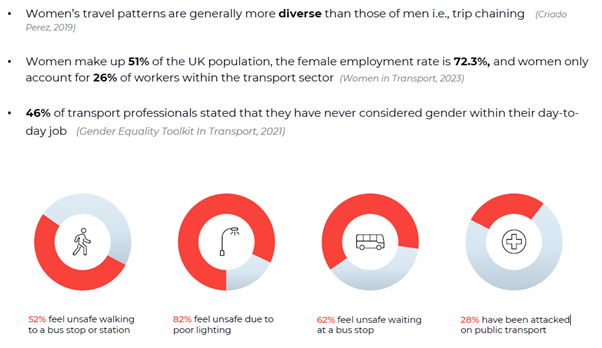Marshlink 175 community celebrations
February 13, 2026, by Paul Bromley
Celebrations have been held to mark the 175th anniversary of the railway line between Hastings and Ashford International. Community representatives, station volunteers and rail enthusiasts held a spec...
Read article


THE NUMBERS:
In 2023, over 1 million crimes against women and girls were recorded in England and Wales, making up 20% of all crimes logged by the police.
84% of women (60% of men) had experienced sexual harassment/assault in their lifetime (2020)
42% of those who experienced sexual harassment in the 12 months prior said the incident happened on the street/walking around, and 28% on public transport.
Transport systems have traditionally been designed to fit the needs of an able bodied stereotypical male commuter. In todays environment a more flexible approach needs to be taken to take into account the needs of a range of passengers. To support women and girls to go about their lives we need to understand their travel needs.
How do women and girls travel?
Women’s travel behaviour differs in significant ways to that of men’s and the expected norms. At its root is the additional caring responsibilities carried out by women. They will therefore break their journeys more often and use a variety of modes (mainly bus and train). Women rate safety more highly than men and adapt their travel behaviour to take account of the risks listed above. Private car travel is currently women’s preferred option.
Would Apps Help?
Technological solutions are often put forward. Almost all the car sharing, bicycle renting etc risked exacerbating travel injustice through cost, impracticality, and safety concerns. They had more success in large cities but had a lesser impact in smaller market towns and had little take-up in rural areas.
What improves safety for women and girls on public transport?
Better Design of public spaces
Improved lighting – darkness is not only at night, brightness not always the answer
Maintained footpaths
Vegetation maintenance
Community involvement through public art, design of shared spaces
Social Attitudes
We all know inappropriate behaviour when we see it, but how best to respond? Active Bystander Training made widely available will help change the culture of hostility and re-establish cultural norms of respect and a community who cares.
On 25th November 2025 the SCRP will support the “Your Community Cares” campaign, using handmade white woollen hearts to gently promote safety, kindness, and community connection across our local rail network. These hearts will be distributed by volunteers at stations, offering a soft, symbolic gesture of care to passengers, staff, and local businesses.
Ref: Maurizio Catulli, Women and Mobility as a Service: An exploration of the issues faced by women when using shared mobility and possible responses by providers: